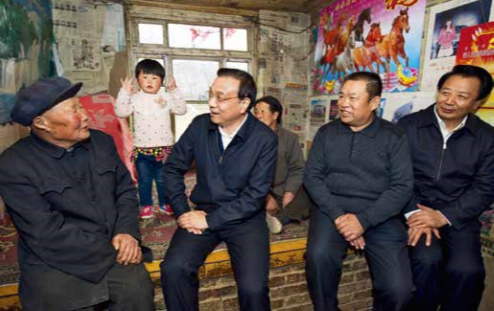Taipingzhuang Village: To address the common problems in northern rural areas
GPIG by Zhang Ling, February 17, 2017 Adjust font size:

On August 20, 2014, Chinese Premier Li Keqiang received a letter signed by all the residents in the village of Taipingzhuang, Ongniud Banner of the Inner Mongolia Autonomous Region. He read it carefully and replied.
On March 27, 2014, Li Keqiang visited the village. He discussed issues with local officials and representatives during a meeting. Afterwards, Party committees at the autonomous region, city, banner, and county levels, together with village leaders, helped solve six pressing development issues.
Great changes were taking place in the village, and the villagers thought it was necessary to write to the Premier. Zhu Yunsheng, the village’s Party chief, spent two days writing the letter on their behalf.
“The Secretary of the Banner Party Committee was about to go to Beijing to report on the progress of work here, so I asked him to help deliver the letter to the Premier. Surprisingly, we got a reply from Premier Li very soon.”
The Premier’s reply made Zhu Yunsheng very excited. He told this reporter, “The fact that the Premier replied to us showed that he recognizes the value of what we are doing.”
Progress in Taipingzhuang
There are 12 villagers’ groups with 587 households and 2,018 people in Taipingzhuang Village. When Premier Li visited the village in 2014, there were 129 registered poor households with 270 individuals registered as poor people.
Premier Li was very impressed by this locality, situated in the east of Inner Mongolia. The six pressing issues put forward by the village leaders and villager representatives are typical problems common to rural areas in the north. First, there is a lack of proper roads, and it is hard to sell products without proper means of delivery. But there is not enough money for road building. Second is the water problem. Plastic mulches can only be used once, and water-saving irrigation costs too much. Third is the problem of electricity. The rural electricity network is unstable, and needs upgrading. Fourth is the problem of medical care. Village doctors often have a very low salary that does not allow them to support a family. Fifth is the prevention and control of sandstorm. More planting needs to be done. Sixth is the training of women. More efforts should be made to help women to find work in agriculture and aquaculture development.
Li Keqiang agreed that the problems were pressing. He said: “These problems are universal, and we should work together to solve them.”
On March 28, 2014, after hearing the work report by the Inner Mongolia Autonomous Region, Li Keqiang emphasized that the six problems presented by Taipingzhuang Village seem minor, yet they represent common problems that concern 500 to 600 million farmers. They are major issues in China, and they cannot be solved by the farmers themselves. They require a coordinated effort from the government and the general public.
On May 23, 2014, the Premier visited Ongniud Banner for the second time. He attended a meeting of the banner’s standing committee, and referred to the issues raised by the villagers for the third time. He said that measures had been taken to address the issues raised by residents in the village since his previous visit, and the list of issues should be made public for scrutiny and checking.
Earlier in September that year, while hearing reports of the Party committees of the Ongniud Banner and the Inner Mongolia Autonomous Region in Beijing, he raised the issue of Taipingzhuang Village and its development for the fourth time. He emphasized that people’s needs and priorities could best be met through education and practice, the key to which lies in putting yourself in the shoes of the people concerned.